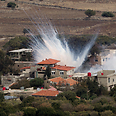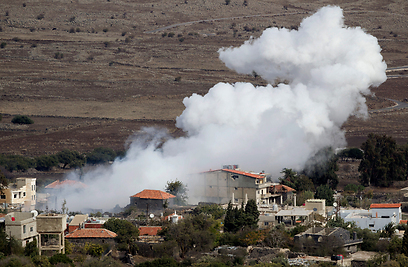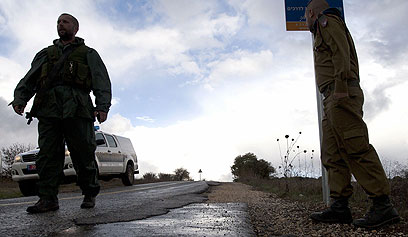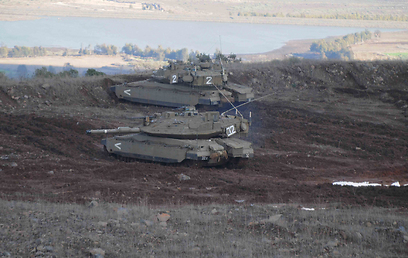
Report: Rebels seize villages on Israel-Syria border
At least 200 rebel soldiers took over Beerajam and Bariqa in demilitarized buffer zone, Israeli military intelligence source tells The Telegraph
Over the past week, two Syrian mortar shells landed inside Israeli territory. The IDF retaliated on two occasions by firing a missile and tank shells. Reports said that the Syrian army scaled down its deployment in the region following the Israeli response.
Related stories:
- Syria pledges to halt fire on Israel
- Rebels warn Israel against Syria interference
- IDF fires at Syria for first time since 1973
"The rebels are employing a clear tactic of drawing the regime forces to fight in these demilitarized areas because of the limitations on the Syrian armed forces," the source said.
"Rebels have seized control of the area north of Quneitra and the area to its south. If they are brave they will try to make a swift move to cut off Quneitra city and cut off the road to Damascus. We cannot rule that out as a next step."

Village of Bariqa after IDF retaliation (Photo: AP)
Meanwhile, a Syrian warplane bombed the town of Ras al-Ain near the Turkish border for a third day on Wednesday.
The jet struck twice before circling and bombing again, rocking buildings on the Turkish side of the frontier and sending up huge plumes of smoke, a Reuters reporter in the Turkish border town of Ceylanpinar said.
The armistice agreed in 1974 prohibits the Syrian government from engaging in military activity within a buffer zone that runs along the length of the Israeli border, with a width just under six miles.
According to Israeli officials, the rebels in control of Quneitra are members of a radical Salafist faction calling itself "Eagles of the Golan".
The group, made up largely of foreign fighters, including al-Qaeda militants from Iraq, boasts that that once it has ousted the Assad regime, it will focus its attention on Israel.

IDF forces on border area (Photo: AFP)
"We are used to a Cold War situation between Israel and Syria but what we are seeing along the border now is a situation similar to that of Lebanon or Sinai, where a weak sovereign state is failing to exert its control over an area that different rebel groups can use to attack Israel," a source said.
On Tuesday, Israel's Channel 1 reported that Assad's regime had conveyed a message to Israel that it will act to prevent accidental fire in the Golan Heights. The message was relayed via the United Nations headquarters that is enforcing the ceasefire agreement between Israel and Syria.
The Free Syria Army warned Israel on Sunday against interfering in the civil war which has been ravaging Syria since March 2011.

Israeli tanks observe border area (Photo: Avihu Shapira)
A report by Turkey's Anadolu news Agency quoted a statement issued by the FSA saying that Israel's rocket fire at Syria on Sunday afternoon was aimed to help the Assad regime in his war against opposition forces.
"Israel assisted Assad's criminal regime by firing at FSA forces that were closing in on Damascus forces and negotiating their surrender," the Free Syria Army statement said.
"The Israeli forces interfered with the intent of saving Assad's force by delivering a direct hit to the rebels and breaking their siege over Assad's criminal forces."
'Israel aiding Syrian regime'
On Tuesday, Mustafa al-Sheikh, the head of the Free Syrian Army's military council said that "Israel is aiding the Syrian regime and its allies in accordance with their partnership."
In an interview with the London-based al-Sharq al-Awsat, al-Sheikh said that "this agreement was clearly evident when Israel allowed Syrian forces to enter UN-controlled zones in the Golan without any objection.
Meanwhile, a shipment of graphite cylinders usable in a missile program and suspected to have come from North Korea were found in May aboard a Chinese ship en route to Syria in what appears to have been a violation of UN sanctions, diplomats said on Tuesday.
South Korean officials seized the shipment of 445 graphite cylinders, which had been declared as lead piping, from a Chinese vessel called the Xin Yan Tai, UN Security Council diplomats told Reuters on condition of anonymity.
Reters contributed to this report
- Receive Ynetnews updates directly to your desktop










